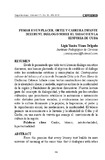Fumar es un placer, Ortiz y Cabrera Infante dixerunt. Diálogo sobre el tabaco en la historia de Cuba

Visualizar/
Data
2013-01Palabras Clave
Caribe, Tabaco, Intertextualidad, HipertextualidadCaribbean, Tobacco, Intertextuality, Hypertextuality
Metadatos
Mostrar registro completoResumo
Desde la premisa de que todo texto literario dialoga con otros
discursos, nos hemos planteado el objetivo de establecer el diálogo
entre las coordenadas estéticas y conceptuales del Contrapunteo
cubano del tabaco y el azúcar de Fernando Ortiz y de Puro Humo de
Guillermo Cabrera Infante como textos constructores del concepto
de la identidad cubana y caribeña, registros ambos de la modernidad
de la región y fundadores de prácticas discursivas. Nuestra lectura
parte del concepto de dialogicidad, y fue orientada por los estudios
culturales, que permitieron establecer la autonomía e interacción
entre distintas prácticas sociales, y evidenciaron las relaciones
entre la cultura dominante y la popular, la hegemonía, el poder y
la reproducción social, las mediaciones, la modernidad. El tabaco
permite un acercamiento a la historia y la identidad de Cuba y el
Caribe, en una suerte de vaivén que semeja el movimiento de la cultura de la región.
Colecciones
Información Adicional
| Otros Títulos | Smoking is a pleasure, Ortiz and Cabrera Infante dixerunt. Dialogue on tobacco in the history of Cuba |
| Correo Electrónico | yanirayanez@hotmail.com |
| ISSN | 1315-9453 |
| Resumen en otro Idioma | From the premise that every literary text builds its own universe of meaning at the same time that it dialogues with other discourses, we have set the goal of establishing a dialogue between the aesthetic and conceptual coordinates of the texts Contrapunteo Cubano del Tabaco y el Azúcar by Fernando Ortiz and Puro Humo by Guillermo Cabrera Infante, as builders texts of the Cuban and Caribbean concept of identity. Both authors are records of modernity in the region and founders of discursive practices. Our reading comes from the concept of dialogic, and it was guided by cultural studies, which allowed us to establish the autonomy and interaction between different social practices, and showed the relationship between the dominant culture and the popular one, the hegemony, the power and social reproduction, the mediations, the modernity. The tobacco allows an approach to the history and identity of Cuba and the Caribbean, in a sort of swing that resembles the movement of the culture of the region. |
| Colación | 159-178 |
| Periodicidad | anual |
| País | Venezuela |
| Publicación Electrónica | Contexto. |
| Sección | Contexto: Dossier |





